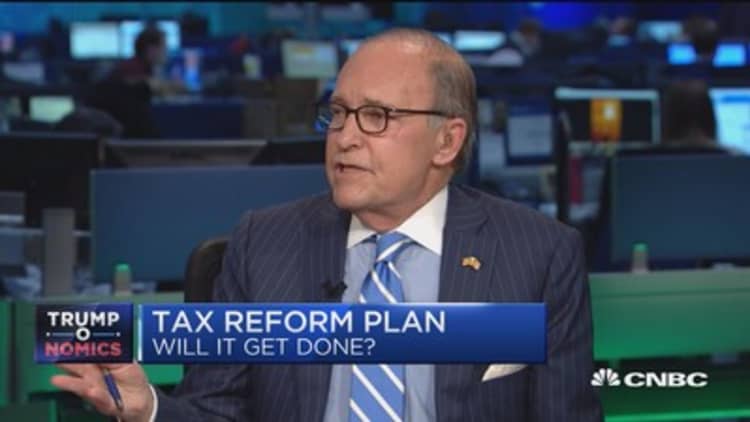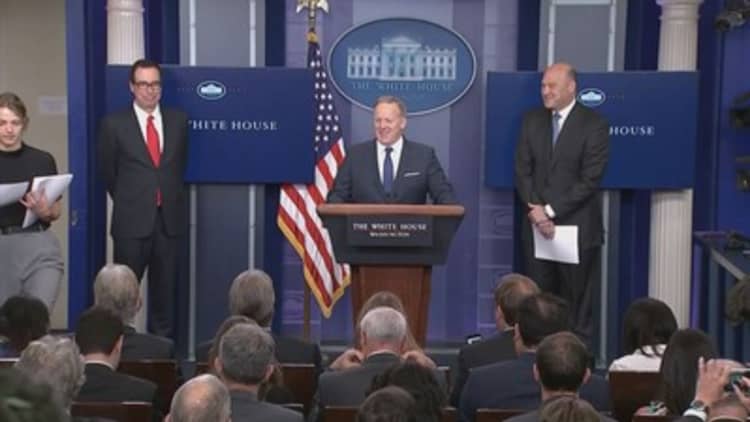The Trump administration's single-page tax plan might be light on details, but tax experts say it's likely that upper-middle-class families, especially those living in blue states, could take a hit, even as the wealthiest Americans get a windfall.
"Nineteen bullet points don't make a tax plan," said Roberton Williams, senior fellow at the Urban-Brookings Tax Policy Center. Tax experts echoed the futility of trying to make projections — or, for average Americans, trying to plan their financial futures — without any detailed insight into what parts of the tax code might change.
For instance, Trump's economic team said it wants to replace the current tax brackets with just three, at 10, 25 and 35 percent, but didn't provide income parameters.
More from NBC News:
Comey: 'Mildly Nauseous' FBI's Clinton Probe Could Have Impacted Election
Trump Meets Palestinian Leader Abbas and Wants Mideast Peace Deal
Refugees Are Fleeing Trump's America for This Tiny Canadian Town
"Some people will potentially come out ahead, particularly if they didn't have a lot of deductions," said Steve Ellis, vice president at Taxpayers for Common Sense. But for families with six-figure incomes who itemize and take a lot of deductions, Trump's plan might not be the tax cut they were expecting.
"You're making lots of guesses," said Chuck Marr, director of federal tax policy at the Center for Budget and Policy Priorities.
High Earners vs Average American
Tax experts say even a household with $100,000 in annual income might not wind up in a better position.
"Somebody in that general economic stratum is somebody who almost certainly works for a living," said Marshall Steinbaum, senior economist and fellow at the Roosevelt Institute. "Their income is going to be drawn from labor," rather than from investments.
This is significant because Trump's tax ideas are tilted heavily towards easing the tax burden on business and investment income.
"There's no doubt that the majority of the benefits will be received by people like Donald Trump himself."
"Relative to what very high-income people will get from it, a family of four at $100,000 frankly isn't going to benefit from much of it," said Jacob Kirkegaard, a senior fellow at the Peterson Institute for International Economics. "There's no doubt that the majority of the benefits will be received by people like Donald Trump himself."

The administration touted its increase of the standard deduction, up to $24,000 for married couples filing jointly, which would likely prompt fewer taxpayers to itemize.
Across all income groups, about 30 percent of taxpayers currently itemize their returns, but that number climbs sharply along with income. Nearly 60 percent of taxpayers with incomes between $75,000 and $100,000 itemize, according to the Tax Foundation, and that figure climbs to nearly 80 percent for those who earn between $100,000 and $200,000.
"Certainly, in many cases, doubling the standard deduction would take people out of being an itemizer," Ellis said.
This might not help taxpayers who live in states with high state and local taxes. Currently, taxpayers in the bottom half of the top income quintile — that is, those with an average income of $129,000 — pay nearly 11 percent in state and local taxes as a percentage of income, according to the Institute on Taxation and Economic Policy. Under today's tax code, they can write off state and local taxes on their federal returns; Trump's plan would eliminate nearly all deductions, save for mortgage interest and charitable donations.
"It's well known that most states with high state taxes are Democratic ones, so there's a clear political implication of that," Kirkegaard said.
Scrapping deductions en masse would affect all sorts of taxpayers. College students and their families would lose the benefit of being able to deduct student loan interest, and there is no word on how or even if higher-education credits that are part of the tax code today would be preserved.
Although the administration specified that retirement savings would be protected, nothing was said about healthcare — either the tax-preferred status of employer-provided plans, or pretax dollars used by the increasing number of high-deductible policyholders for their health savings accounts.
Penalties for Parents?
During the presidential campaign, Donald Trump called for eliminating personal exemptions. "That's an important thing," Marr said, because this could hurt large families who right now can claim an exemption for each child.
Eliminating head-of-household filing status, another idea Trump embraced during his campaign, also would hurt large families, and single parents, as well.
"The whole plan is aimed at an across-the-board tax break for corporations."
"Every single mother — and father — in the broad middle would see a tax increase because you have this less favorable filing status, and they'd lose the personal exemptions for themselves and their kids," Williams said.
Although the proposal was touted as a middle-class tax cut, "if they don't do it the right way, it won't be," Williams said.
Some tax experts were blunter in their assessments. Steinbaum said middle class families would derive little benefit from a tax plan that caters to billionaires and corporations. "The whole plan is aimed at an across-the-board tax break for corporations," he said.
"It's not really a proposal. It's a set of ideas… it's an ideological direction," Kirkegaard said. "It goes in a regressive direction and it leaves the future generations to pay most of the bill."
Watch: What's really in the Trump tax plan


